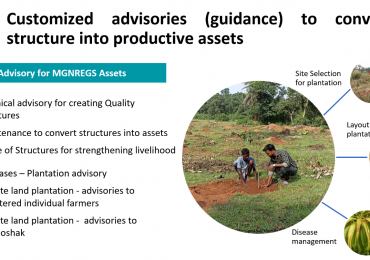As a part of CoRE Stack- a collaborative network of organisations working in the natural resource conservation and management space- Gram Vaani’s volunteer network has been mobilising citizens to think and act on climate change effects on their ecosystems. The project, now known as Commons Connect, provides data and facilitates gatherings and participation at the settlement level between multiple stakeholders, to ensure that they all have a say in the way natural resources are planned and distributed. The team conducted several ward sabha meetings to understand the issues on the ground and explain the various concerns of climate change- this was a part of the problem statement scoping and brainstorming for solutions.
The Problem: Currently, due to historical hegemonies of climate, geography and socio-economic factors, citizens in rural India have struggled with circumventing power inequality and putting forth their demands for infrastructure in their localities. This is because of the lack of data driven approaches, transparency between levels of the government, citizens and bureaucracy, or due to the unavailability of complementary tech and programmatic decision-making tools.
The Solution: The Common’s Connect initiative which works at the intersection of participatory rural appraisals that use a combination of data and on-ground planning for informed decision-making around natural resource management.
In January 2024, the Gram Vaani team capitalised on their existing networks of trust and citizen mobilisation to conduct ward sabha meetings with over a hundred citizens in three districts, to understand the issues on the ground and understand the community’s perspectives towards climate change. This was followed by a thorough needs gathering and encouraged communities to take action towards climate resilience within their local geographies.
On-ground actions:
The Mobile Vaani team worked on content creation around climate change stories within these neighbourhoods, as well as field mobilization. The latter focused on:
Mobilizing the community toward climate change mitigation action through understanding the context and changes in the landscape. Furthermore, using these insights to work towards long-term planning for climate change impact.
Demand generation for government schemes and services to mitigate climate change effects. This was driven by the Mahatma Gandhi National Rural Employment Guarantee Act (MGNREGA/NREGA) and similar schemes.
Mobile Vaani Club ( a localised federated community media clubs) team members organized multiple community meetings in various locations of Jamui, Koderma and Giridih districts to make people aware of the effect of climate change on human lives, alternative strategies to deal with the change and how to raise community demands for various infrastructure and services that can help communities to mitigate global warming effects.
Jamui one of the poorest districts of Bihar come forward for a Collaborative Plantation Planning
In Purvi Googldih Panchayat Gidhaur Block, Jamui district of Bihar, citizens were facing issues of failed paddy crops, low groundwater recharge and overuse of existing resources. These insights came up through the eight mobilization events by Gram Vaani’s sponsored Mobile Vaani clubs. Over one-fifty people attended these meetings, where they came to agreements about the construction of community soak pits and pooling in land for plantations.
After four meetings, nine marginalised farmers came together to demand saplings for a plantation project- they put together their land declarations with clear documentation of where and why they needed these plantations. In the next four meetings, they requested other support such as expert advice on land preparation, boundary nets and water resources for the adequate watering of the saplings. This documentation was prompted by the Club members and the plans were successfully submitted to the Block Planning Officer with the help of ward and panchayat elected members- who had finally approved the distribution of a hundred saplings to each farmer.
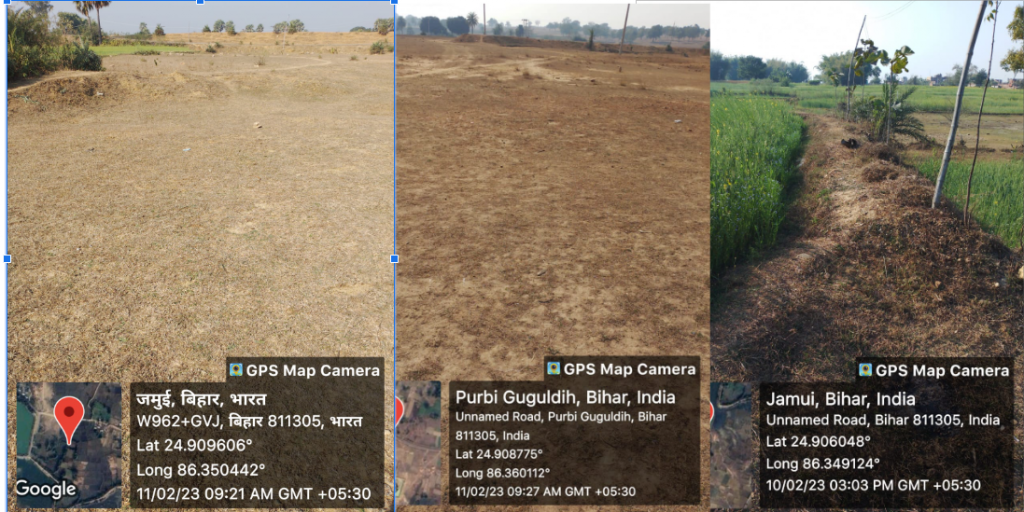
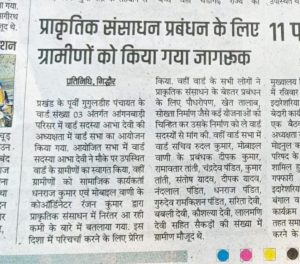
The implementation team recently recorded a video during discussions with the farmers, who were thrilled with the plans and the process and explained how this would bring a positive impact on their livelihood in the long run.
https://drive.google.com/drive/u/0/folders/1RWv5WZfNHwluVpkkqkaBCghNVVu-T_VV
Koderma’s Soak Pits
The mobilization effort in Dodhakola Panchayat, Koderma district of Jharkhand, was quite successful. Initially, the Gram Vaani team tried to understand the community’s perception of NREGA. After two meetings, they discovered that due to delayed payments and issues with reimbursement, people were sceptical of the scheme. Through intense discussion and engagement, the team was able to see that the community understood the effects of climate change- especially on groundwater resources, and with some prompting, they proposed a plan. The Mukhiya visited the areas where four community soak pits had been proposed and added them to the plan. The Gram Sabha passed a proposed plan and the next steps are being discussed with the program coordinator, to ensure this is an efficient and well-executed process.
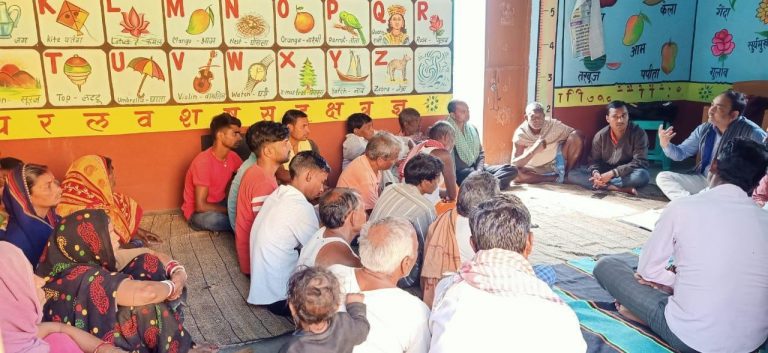
Belgai’s Community Efforts
In a village with mostly Adivasi population, water supply is a big issue despite the strong culture of protecting natural resources- causing locals to migrate to far-off cities. This situation was unfolding in Belgai village, Advara block, Giridih District, revealing an alarming inconsistency in the way the locals were used to seeing their landscapes. After three community meetings, the Gram Vaani volunteer team facilitated a strong ethic of discussion and participatory decision-making.
Over 50 members actively participated in the discussion and they disclosed that the panchayat representative had been informed of several demands around natural resources over time- these were issues around land levelling, canal boundary repairing, and the need for pond construction to preserve rainwater- all ideas and suggestions that would directly have an impact on tackling climate change repercussions on the landscape.
The Mobile Vaani volunteers advised them to document the key discussions and the demands with details about the land. They suggested that this could be directly submitted to the mukhiya of the panchayat.
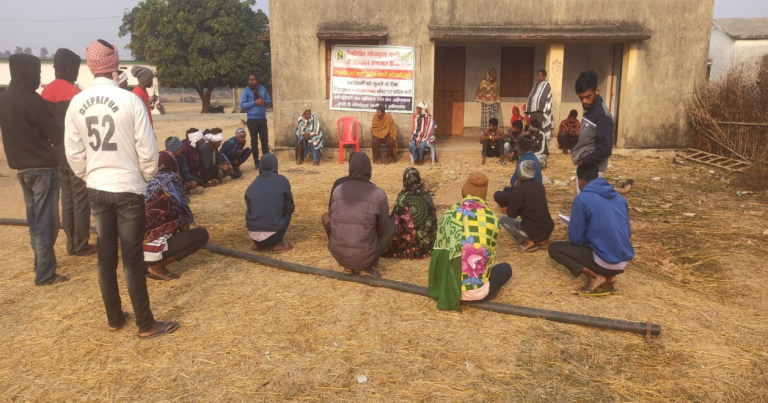
Via a diligent follow-up process, the volunteers and Mobile Vaani representatives urged the inclusion of these demands in the NREGA works plan. The demands were incorporated, leading to the successful construction of ponds on the lands of Heeralal Tudo and Prakash Tudo. Heeralal Tudo’s pond measures 50 ft in length, 60 ft in width, and 10 ft in depth. Thirteen MGNREGA workers were employed for over two months, and they received their wages directly in their bank accounts. Similarly, a pond of the same size was constructed on Prakash Tudo’s land, with twelve workers completing the task in two months and six days. They, too, received their wages directly in their respective bank accounts.
These ponds are projected to provide significant benefits to over fifty individual families by serving as a reliable source of irrigation. Moreover, they will contribute to enhancing water recharge within the village- resulting in improved plantation, agricultural crop production, and overall livelihoods of the farmers. The farmers are optimistic about the potential of these ponds to collect a substantial amount of water, which would enable them to engage in fishery cultivation. This venture would allow them to sell their produce in nearby villages, enhancing economic opportunities in the region.
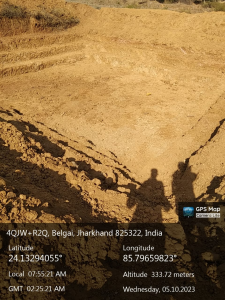
Detailed Step By Step Process:
A comprehensive step-by-step approach was employed to ensure the successful Mango Tree plantation.
Community Mobilization Initiatives: Gram Vaani volunteers kick off the process by organizing meetings within the village. During these sessions, community members discuss the challenges they face in agriculture, access to drinking water, water availability for cattle, and the impact of depleting water levels in the village. Through these discussions, the community becomes increasingly aware of water-related issues.
Issue Recognition and Solution Exploration: Once the community acknowledges the water-related challenges, volunteers engage them in identifying potential solutions. Volunteers showcase documentaries, illustrating successful water management initiatives in states like Rajasthan and Maharashtra, emphasizing the power of collective community action.
Community Needs Assessment: Following discussions, community members collaborate to compile a list of their needs. The major demands often revolve around constructing ponds, and soak pits and initiating fruit plantations on their land. Water-based demands are popular.
Inclusion in Panchayat Gram Sabha Demand: To formalize their demands, volunteers invite ward members to hear the community’s concerns. The ward members collect signatures and thumbprints from community members and present the demands at the Panchayat Gram Sabha.
Submission to Block Officers: With the consent from Mukhiya the ward members submit the community demands to the block officer, who assures that the requests will be addressed. Community members are advised to wait until the rainy season and then submit applications for technical assessments by the engineering team.
Application Process: Community members fill out applications, providing land records and property ownership documents. Some farmers may face delays due to unpaid land taxes and receive assistance from volunteers and patwaris to settle their tax obligations.
Technical Assessment and Approval from the Block Office: The engineering team evaluates the landscape and elevation of the proposed sites. Once approved, the community receives assurance that plans for the assets, available at a nominal cost, will be provided during the upcoming monsoon.
Plantation Implementation: Farmers collectively obtain plants from the department. With technical support, seven farmers successfully planted mango trees on their land. The demand for protective shields for the plants is raised and addressed after two follow-ups.
Guard Acquisition and Maintenance: Farmers receive protective nets for their plants- safeguarding the plantation. Those who invested in the plantation on their own- use bamboo at the boundary of the land to prevent thefts. Continuous communication with the horticulture department and KVK ensures that farmers receive guidance on pesticide use, and watering practices, and resolve other concerns.
Technical Support and Knowledge Dissemination: Volunteers maintain a connection with the horticulture department and KVK to address farmers’ queries and concerns about pesticides, watering techniques, and other aspects. Technical and scientific information is provided to empower volunteers to respond effectively to farmers’ questions.




